- Home
- Regan Walker
A Secret Scottish Christmas (Agents of the Crown Book 4) Page 8
A Secret Scottish Christmas (Agents of the Crown Book 4) Read online
Page 8
Drawing his attention to the triangular scones, she said, “Don’t you want to try a scone?”
“Those are scones? They seem a bit… flat.”
“Do not be insulting Martha’s girdle scones or she will be denying you supper. Try one.”
“Very well, because you asked,” he said with a brilliant smile, looking very much like his twin. She didn’t have to ask if he was Nash since he wore the same coat he’d had on when she’d encountered him in the orangery.
Ignoring the curds mixture, he added a scone to his plate and carried it to the table. With a few adds to her own plate, she took the seat across from him.
He picked up a scone and lathered it with marmalade and butter. “I will content myself with this, a biscuit and the eggs.” He looked at her with a hopeful expression. “I don’t suppose there is bacon?”
She chuckled. “We Scots do not favor pork as do the English. Did ye nae ken the Scots call the English ‘pork-eaters’?
“What?”
Ailie gave him a sidelong glance. “You need take no offense. ’Tis just one of those curious things, like the French calling the English ‘rosbifs’. Some Scots do raise pigs, but most often they send the carcasses to Aberdeen where they are salted for export.” She went to the sideboard to bring a dish to the table and placed it before him. “Don’t you want to try the smoked haddies?”
“The what?” He pursed his lips as he stared at the plate of haddock, their skins bronzed from the smoking process. Ailie was highly entertained. “Perhaps later,” he said, clenching his teeth.
It was all Ailie could do not to laugh. “’Tis a shame,” she said, forcing her expression to remain serious. “They’re a specialty of this part of Scotland, you know.” She shook her head and reverted to a Scot’s way of speaking. “If ye’ll nae try the haddies or the gruitheam, we ha’ verra guid chocolate and tae.”
He stared at her openmouthed for a moment. “Tea, please.”
She fought a fit of laughter, but there was something about his honesty, much like that of a small boy, that charmed her. Having dismissed the footman when she first entered the room, Ailie poured Nash his tea.
With a nod of thanks, he happily settled into his breakfast.
From beneath her lashes, she watched him eating his eggs and marmalade-lathered scone and had to admit he and his brother were attractive men, broad-shouldered and well featured. And those hazel eyes. Right.
She speared a bit of haddie on her fork. “What kind of ships do you design?”
“Schooners and sloops mostly but, unlike you, I only dabble in the design of the merchant ships we sail. I give my drawings to Tara who sends the ones she likes to her family in Baltimore. Stag Shipping, her family’s business, has used a few. From what I saw, you are an expert. I’m still amazed at the Ossian.”
“Is that because the designer is a woman?”
He sighed heavily. “You needn’t be prickly. I was amazed because I have never seen such a schooner. Once I considered the effect of the changes you made, I could see they would increase the ship’s speed. You must show me your drawings and tell me what led to your design.”
“All right,” she said, wondering how much she would tell him. “I keep the drawings in the office. After I show you around the yard, we’ll go there.”
When they were finished eating, he helped her put on her cloak and donned his greatcoat before she led him out into the frigid morning air.
She stared up at the sky. In the distance, gray clouds hovered. “I do hope the snow holds off till tomorrow.”
“Me as well. Today is the day we’re going to select the Yule log,” he said cheerily. The look in his hazel eyes reminded her of a small boy out for an adventure.
He might be adorable, but he was no boy. Like his twin, Nash was tall, lithe and muscular, with a strong manly jaw. His dark hair, tinged with gold from the sun, curled around his nape. She wondered what it would feel like to run her hands through those curls. She let out a sigh. His coming to Arbroath made her want things she had not thought of in a long time.
“Knowing my brother,” she said, “he will hunt for the log to please Emily even if it snows.”
Nash stepped into the cavernous main shop of the shipyard, the air warmed by stoves placed about the room. Light spilled into the large space from windows high in the timbered walls. The noise in the shop echoed off the high walls.
He counted twenty men working. Some, with long-handled mallets, pounded the inside of the hull that stood open to the room, the weather deck not yet in place. The youth of a few suggested they might be apprentices. Two sawyers were bent to the task of cutting wood. Other men concentrated on joining timbers.
“We can leave our outer garments here,” Ailie shouted.
He helped her to shed her cloak, sliding the back of his fingers over the tops of her arms. The gesture had been innocent but the contact with her, even with her wool gown between them, set his pulse racing. Her faint sweet scent drifted to his nostrils causing him to inhale deeply.
She had changed clothing since the orangery and now wore a sensible woolen gown, but its simple lines did not detract from her loveliness. As before, she wore her fiery hair long and tied back with a ribbon.
He placed her cloak on a peg where the workers’ coats hung in a long line. Doffing his greatcoat, he added it to the collection.
“Come,” said Ailie, “I’ll introduce you to the foreman.”
She walked briskly toward a man who stood to one side, arms crossed, observing the progress of the work. Nash fell into step beside her.
The foreman must have sensed their approach. As they neared, he turned and smiled at Ailie. He was somewhere in his forties, Nash judged, with thick red-blond hair and striking blue eyes. His manner was congenial, particularly toward Ailie. Obviously, he liked his job and the boss’ sister.
“Good morning, Miss Stephen. Yer brother told me ye’d be comin’ by with a visitor.”
“Mr. Ferguson,” she said, her voice rising over the din of the shop, “this is Mr. Powell, one of our guests from London. He and his brothers are here on holiday. They’re interested in the yard as they are in the shipping business in London.”
Ferguson extended his hand and Nash took it. “I’ve heard of Powell and Sons. We make fine ships here, Mr. Powell, should ye be wantin’ one.”
Nash grinned. “I would agree. My brothers and I had the pleasure of sailing on the Albatross from London.”
Ferguson smiled. “Aye, that would be the one we modified to carry more passengers.”
“If it’s agreeable with you,” Ailie said to the foreman, raising her voice, “Mr. Powell would like to look around.”
The foreman glanced at Nash and nodded. “Of course. Ye know our yard as well as anyone, Miss Stephen. But I’m happy to answer any questions ye might have, Mr. Powell.”
Nash was eager to hear what Ailie had to say but, as a matter of courtesy, he would allow the foreman to speak first. “Could you tell me about the schooner you are working on now? Then we’ll just look around.”
“Be glad to.” He turned to face the ship under construction. “This one’s a merchantman for Glasgow, larger than most we build. The men are just finishin’ the hull before they start on the captain’s cabin, galley and crew quarters.” He went on to explain in some detail the configuration that would be constructed below decks. It was not unusual but the foreman did have an eye for detail.
When the foreman finished, Nash thanked him and then strolled with Ailie around the ship’s hull. Ailie pointed out things Nash might have missed.
“The keel is of tropical purpleheart wood from Tobago. The hanging knees in the bow are made from American live oak.”
Nash eyed the hull fasteners of pure gleaming copper. He gave a low whistle. “Such fine materials come at a dear cost.”
“Aye, but then the best usually does.” Running her fingers over the hull, she added, “We sometimes use English oak, shipping it up from the Thames. I
just like the American oak better.”
As they passed the workers, the men looked up from their tasks and waved to her. She knew each one of them, calling them by name. Despite the appearance of a beautiful redhead in their midst, not one of the men leered at her. In their eyes, Nash saw only respect.
Perhaps it was her skill at designing ships but, reconsidering, he rather believed she and William knew their craft and treated their workers well.
His conclusion was confirmed when she said, “They will have time off for Hogmanay to spend with their families, so they work hard to finish what they can before they leave.”
“That’s generous of you and William.”
“There’s more. When they leave for the holiday, Will gives each a drink of brandy. His way of thanking them.”
“No wonder they like working here.”
“In the summer,” she added, “Will has casks of ale delivered to the shops on hot days.”
“Again, I am impressed.”
“Will and I learned the importance of treating our workers well from Father.”
She took him to the blacksmith’s and then to the joiners’ shops. Like the main shop, each was clean and neatly kept. He couldn’t help thinking that was at least in part due to her influence.
“Shall we go to the office so you can see the drawings of the Ossian?”
“I was hoping you might suggest that,” he said, returning her smile.
With Nash at her side, Ailie drew her cloak tightly around her and took the path to the office. As they entered, she was surprised to find the iron stove well stoked and the room warm.
“Will must have asked the servants to keep the stove going.”
“So this is where you created the Ossian,” he said, taking off his greatcoat to reveal his dark blue tailcoat and buff breeches. Any woman would think him handsome. “And where you work?”
“Much of the time.” She slipped her cloak from her shoulders, laid it over her chair and reached down to open the drawer that held her most favored drawings. “I am sometimes in the shop with Mr. Ferguson. But it was here I first began the Ossian’s design.” She lifted the drawings to the top of her desk. “It’s been some time since I looked at my design. Our orders are for more ordinary ships.”
Would she ever see the Ossian in the water?
Nash took a pair of spectacles from his pocket and came to stand beside her, his shoulders mere inches from hers. She could feel the heat of him as he leaned over the drawings and detected the faint scent of sandalwood.
He took off his spectacles and turned to speak to her.
She was already facing him when their gazes met. Neither looked away.
In the moments that passed, Ailie felt the room grow overwarm and she began to feel awkward so close to a man she did not really know.
She stepped away from his intense gaze, her heart thudding in her chest.
“Tell me about the Ossian,” he said a husky voice.
Without looking at him, she traced the lines of the schooner on the drawing and began to explain something she had never told anyone. “I saw the ship in a dream, its sleek black hull and its billowing white sails against a blue sky, as its bow cut through a wind-tossed sea. ’Tis stamped on my mind like a part of me.”
Emotion gathering in her voice, she raised her gaze from her desk to the ships outside the window and the North Sea beyond, seeing again what she had first experienced in the dream. “I could feel the schooner rolling through the waves and the salty spray whipping my hair across my face as my heart raced in my chest.” Then turning to face him with tear-filled eyes, she said, “I was there, Nash. On the ship. And somehow, I knew one day it would be real.”
For a few seconds, he said nothing, just stared into her eyes. Had she revealed too much to a man she barely knew?
He nodded slowly. “I believe it, too, Ailie. One day, you will sail on her and I would dearly love to be with you when you do.”
She cleared her throat, blinking back tears as she glanced down at the drawings. “You are kind to humor me.”
“I’m not humoring you.” In his voice she detected only sincerity and maybe, just maybe, admiration. “I believe you will see your ship built one day.”
“’Tis a pleasant thought.” Forcing her eyes away from his penetrating gaze, she glanced out the window. “If we want to be in on the Yule log hunt, we’d best be going.”
On the way back to the house, she realized she had identified a difference between Nash and Robbie. Nash wore spectacles but she’d not seen them on his twin.
Robbie managed to reach his chamber without being seen. There, he changed back into the breeches and dark green tailcoat he had worn before setting off to the town. He pulled on his polished tall boots and tied a simple cravat before joining the ladies in the parlor, where he hoped to find a warm brandy and a warmer fire.
Both were soon forthcoming.
He relaxed into one of the gold wing chairs set before the fireplace, nursing the glass of brandy cradled in his hand. Time passed as he pondered what he had learned.
In the other wing chair, sat Martin’s wife Kit busy drawing. To be precise, she was sketching him. She had told Robbie he must submit since his older brothers had been quick to give their consent.
“I drew Emily and the countess before you arrived in the parlor. It’s my thought to sketch everyone before we return to London and give the sketches to William and Emily as a remembrance of our visit.”
“A thoughtful gift,” said Robbie. Considering Kit’s talent, known to everyone in the family, it was an exceptional gift.
Her pencil made faint scratching noises as she worked, her blue eyes darting between the sketchbook and him.
“You have an interesting face, Robbie.”
“You have guessed right.”
“I did not guess.” Her upturned nose rose a bit higher. “You must remember, I have observed you and Nash on other occasions, enough to be pretty certain it was you. There is much more to you than appears at first glance. Your face speaks to me of your own character, different than Nash’s.”
“But Nash and I are just alike,” he protested, hoping Martin’s talented wife did not see too much. “Even our mother has trouble telling us apart.”
“Perhaps under some circumstances, I, too, would have difficulty.” She paused to incline her head while carefully regarding him, then resumed her sketching. “An artist notices small differences others might miss. I often see people as animals.”
“Do you?”
“For example, I see you as a playful otter, while Nash, to me, is the silent jungle cat, more dangerous than he might appear at first.”
“Perhaps beneath the otter is a lion.”
She laughed. “Oh yes, I see that, too.”
Robbie hoped others did not observe all his sister-in-law saw. He and Nash staked their lives upon the fact people could not tell them apart.
An aged hand rested on his shoulder. Robbie looked up to see the silver-haired Lady Claremont, peering at him through her quizzing glass. On her face was a sober expression. He felt like an insect under a magnifying glass.
She straightened, dropping her glass. “You do wear a mask, young man. A charming one, I grant you, but still a mask.”
“See?” said Kit. “I am not the only one who sees the otter before the lion.”
Robbie held his tongue, afraid anything he might say would speak of hidden truths.
“Mark my words,” the countess went on, “I know your type well. You will be snatched from your bachelor state in the wink of an eye.” Then she gave out a “Humph” and muttered, “A rogue seldom sees his fate coming.”
He grinned and tried to make light of it. “Who am I to argue with The Grand Countess?”
She patted him on the shoulder. “Very wise, Mr. Powell.”
“Would you care to sit down? I would happily give you my chair.”
“No, thank you. I am tired of sitting.” Her head swiveled toward the door. Robbi
e’s gaze followed. “Ah, the mighty hunters return,” she announced.
Kit set her sketchbook and pencils on the table where her glass of sherry rested and stood. “I’ll finish this later.”
Robbie got to his feet to welcome the hunters back. They came toward the fireplace, reaching their hands toward the flames. “How was it?” he asked Ormond.
Hugh rubbed his hands together. “Cold enough to freeze fire.”
“Not for a Scot,” replied William, looking askance at his friend. “I can see the comforts of London have made you soft.”
“We shall see about that, my friend,” Hugh tossed back. “Our time together has only begun.”
Kit kissed Martin on his cheek. “Welcome home.”
“I missed you, Kitten.” He drew her into his arms. “You’re warm.”
Robbie watched the pair for a moment and then turned to see Mary embracing her husband. ’Twas not surprising Hugh had fallen for her.
Tara appeared in front of their oldest brother Nick and planted a kiss on his lips.
Robbie envied Hugh and his brothers their wives. Sharing common pursuits with a woman as well as a bed appealed but, even more, he envied them the loyalty and affection their wives showed them. Perhaps it was time he considered marrying. The countess might have the right of it. Perhaps his fate was already before him. Could the alluring Mistress of the Setters be a candidate for his wife?
“You smell of pond, Husband,” Tara chided Nick as she nuzzled his neck. “Did you bag many birds?”
“Dozens, my love,” he replied, slipping his arm around her waist.
William draped his arm over Emily’s shoulder. “We’ve enough for soups, stews and roast goose aplenty.”
“Now I’m jealous,” said Tara, her blue-green eyes solemn beneath her frown. “I should have borrowed a stable boy’s breeches and tagged along.”
Robbie chuckled remembering his sisters-in-law knew how to shoot. And this particular one had donned breeches many times to climb the rigging of Nick’s ship. Their two young sons would surely grow up to be ship captains. With parents like that, how could they not?

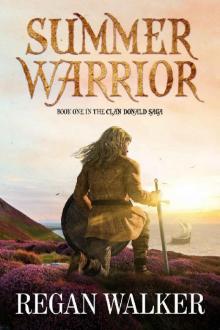 Summer Warrior (The Clan Donald Saga Book 1)
Summer Warrior (The Clan Donald Saga Book 1) Echo in the Wind
Echo in the Wind Once Upon a Christmas Past
Once Upon a Christmas Past A Secret Scottish Christmas (Agents of the Crown Book 4)
A Secret Scottish Christmas (Agents of the Crown Book 4)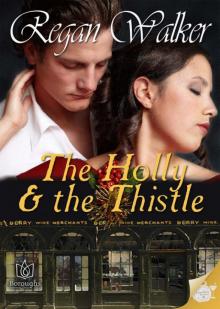 The Holly and the Thistle
The Holly and the Thistle Racing with the Wind (Agents of the Crown)
Racing with the Wind (Agents of the Crown) Wind Raven (Agents of the Crown)
Wind Raven (Agents of the Crown)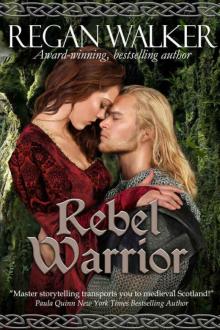 Rebel Warrior (Medieval Warriors #3)
Rebel Warrior (Medieval Warriors #3)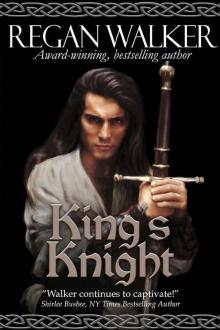 King's Knight (Medieval Warriors Book 4)
King's Knight (Medieval Warriors Book 4)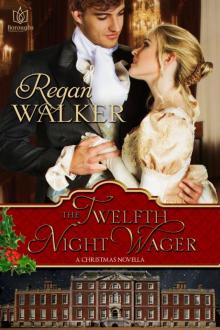 The Twelfth Night Wager
The Twelfth Night Wager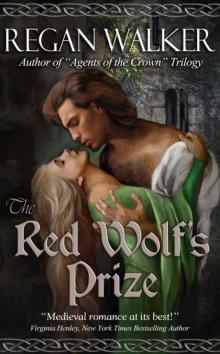 The Red Wolf's Prize
The Red Wolf's Prize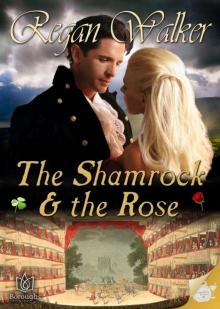 The Shamrock & the Rose
The Shamrock & the Rose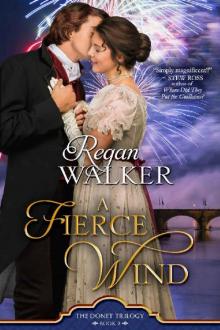 A Fierce Wind (Donet Trilogy Book 3)
A Fierce Wind (Donet Trilogy Book 3)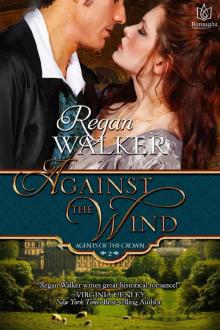 Against the Wind (Agents of the Crown Book 2)
Against the Wind (Agents of the Crown Book 2)